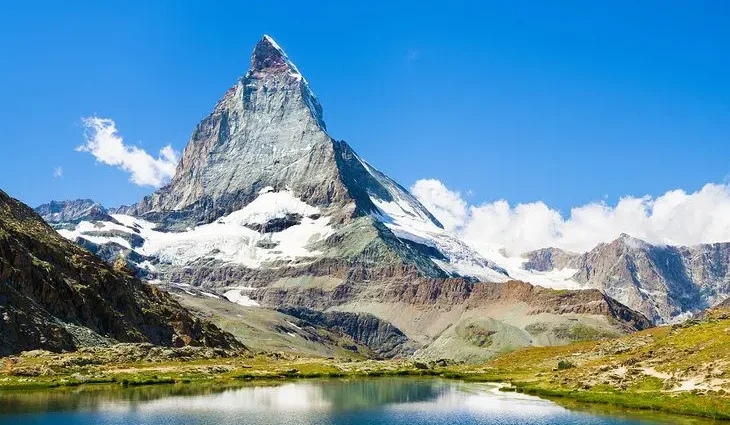Contents
- 1. Experience the Matterhorn
- 2. Visit the Top of Europe at the Jungfraujoch
- 3. Get Lost in Swiss National Park
- 4. Watch the World from Above at the Interlaken Viewing Platform
- 5. Go Canoeing or Kayaking on Lake Geneva
- 6. Go Skiing near St. Moritz
- 7. Catch the Cable Car to the Top of Mount Titlis
- 8. Take a Boat Tour of the Rhine Falls
- 9. Ride the Glacier Express
- 10. Hike in Grindelwald
- 11. Climb to the Top of the Grossmünster for Amazing Views Over Zurich
- 12. Explore Lake Lucerne’s Chapel Bridge
- 13. Visit Gruyères, the Cheese Capital of the World
- 14. Step Back in Time at the Château Chillon
- Map of Things to Do in Switzerland
With its majestic Alpine lakes, snow-covered peaks, and lush valleys that seem to go on forever, Switzerland needs no introduction. If you’re thinking of visiting, Switzerland’s most famous sights are probably already on your must-see list. But you’re probably also wondering about the top things to do in Switzerland.
With so much amazing nature to explore and cities to discover in Switzerland, adding something different to your trip could turn a simple vacation into the memories of a lifetime. So go ahead and climb a mighty mountain, hike a national park, or dare to take on the world-famous ski slopes.
Plan your trip with our list of the top things to do in Switzerland.
1. Experience the Matterhorn
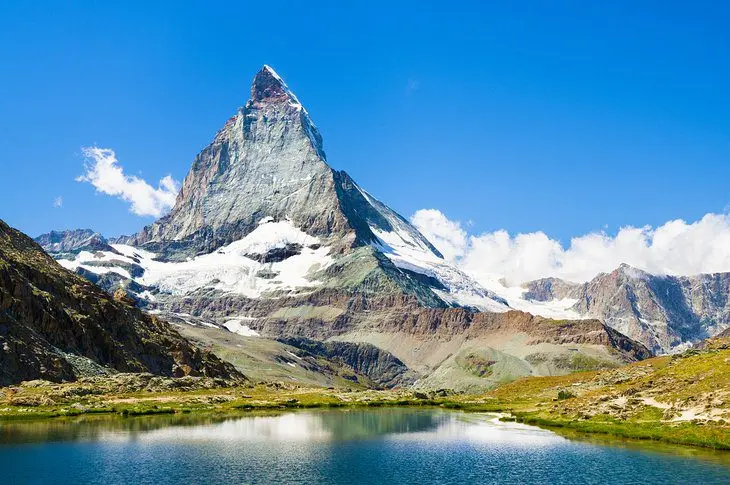
The pyramid-shaped Matterhorn sits almost 4,500 meters above sea level just over the border between Italy and Switzerland. Located near the beautiful town of Zermatt, the mighty mountain dominates the skyline and offers plenty of opportunities for outdoor enthusiasts to ski, hike, and enjoy the views.
If you arrive between July and September, however, one of the most popular activities is climbing. All four available routes to climb the Matterhorn depart from Zermatt, with the most popular being the North-East route (the original route used during the first ascent in 1865).
Depending on weather conditions, it takes between eight and 12 hours to summit on a mix of Grade 2 (exposed edged ridges) and Grade 3 (some hard, technical climbing) terrain.
Snow and altitude sickness make the last third of the climb very difficult, so only fit climbers should try.
2. Visit the Top of Europe at the Jungfraujoch

The Jungfraujoch is a glacial pass connecting the Jungfrau and the Mönch, two of the mightier mountains in the Bernese Alps. The stunning pass and the open views over the surrounding snowcapped peaks are enough of a reason to visit the Jungfrau Region, but getting to the top of the mountain is actually the best part.
The Jungfrau Railway, the highest train line in Europe, reaches above the perennial snow line, with the top station at a 3,454-meter altitude. It makes its way there by running mostly through a tunnel, with stops at stations where visitors will find special windows to see the striking Eiger peak.
Once at the top, there are hiking trails that go out into the glacier, a viewing platform at a stunning height of 3,572 meters, and one of the highest astronomical observatories in the world.
3. Get Lost in Swiss National Park
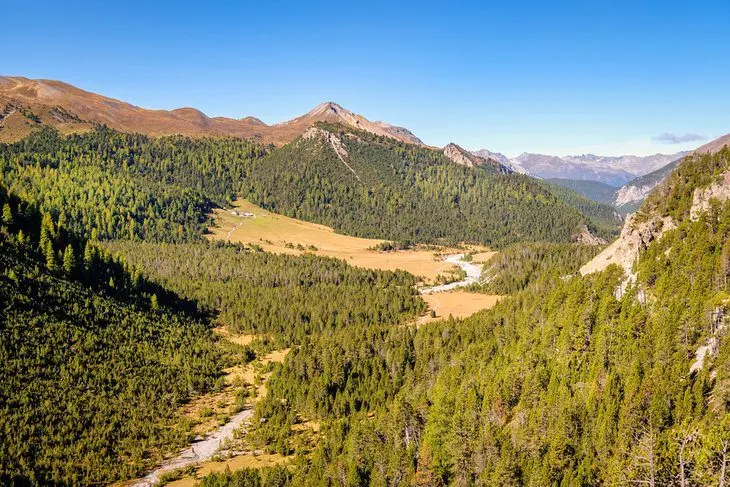
Switzerland’s only national park covers just under 175 square kilometers of stunning mountain landscape. Flowering Alpine meadows, deep-blue lakes, and high moors make this a popular place to visit.
Hikers will find over 80 kilometers of hiking trails here in an area where nature has been left to “grow wild,” and the result is that you will likely end up crossing paths with everything from ibexes to chamois to golden eagles as you hike around.
To get started, try the 21-kilometer-long Lakes of Macun hike for beautiful sights of turquoise blue lakes, or head to Munt la Schera for a 13-kilometer-long hike that runs near the Italian border and offers beautiful views over the neighboring Stelvio National Park.
Beautiful Val Cluozza is especially worth a hike in either spring or autumn, when the trees change colors and the wildflowers take over everything.
4. Watch the World from Above at the Interlaken Viewing Platform
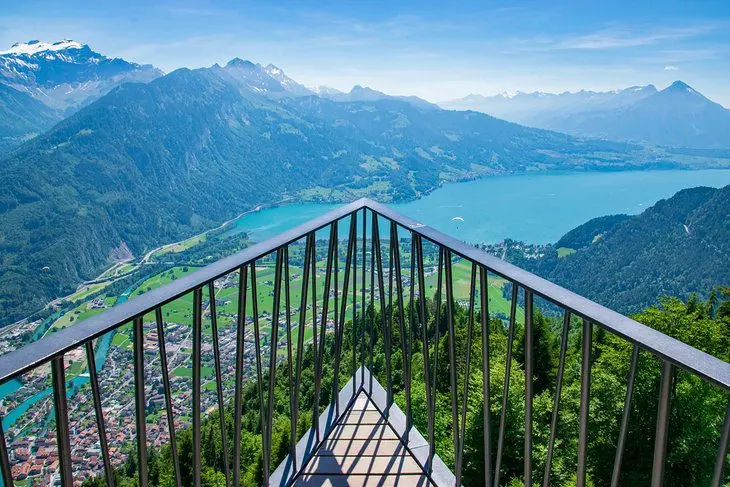
Interlaken’s scenic surroundings and stunning landscapes are a major draw for outdoor enthusiasts.
It’s no surprise that one of the best views of Interlaken’s natural beauty is from up above – way up from the top of the 1,322-meter-high Harder Kulm mountain, where the Interlaken viewing platform is located. It’s one of the top things to do in Interlaken and a dream come true for those looking for adrenaline-pumping activities, but also for photo aficionados.
To get there, you’ll have to take a 100-year-old funicular railway, or brave a steep hike.
The best vantage point for panoramic photos once at the top is the viewing platform (or “Two Lakes Bridge”), which looks right over Lake Thun and Lake Brienz with the town of Interlaken in between. The mighty snow-covered Jungfrau and Eiger mountains are also visible from here.
A charming restaurant serving traditional Swiss and European cuisine (as well as some surprise dishes from other places) offers a nice escape during wintry days.
Accommodation: Where to Stay in Interlaken
5. Go Canoeing or Kayaking on Lake Geneva
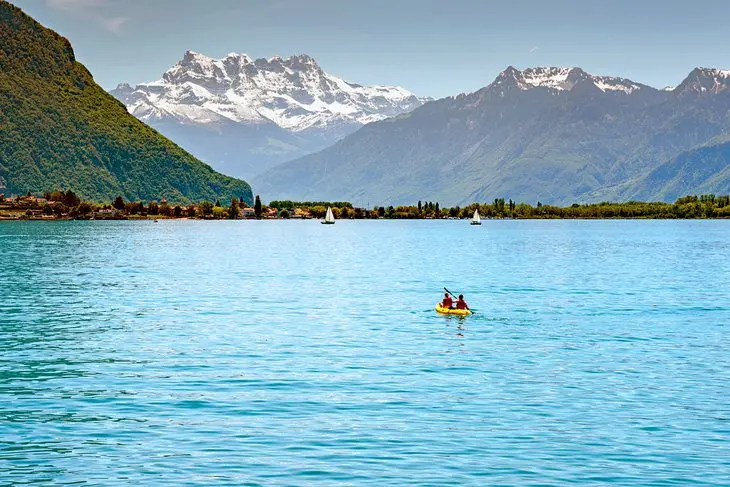
Shared with neighboring France (Switzerland owns 60 percent of it), Lake Geneva is a very deep, large lake with lots to offer. If you’re looking for a way to connect with nature while surrounded by stunning views, Lake Geneva will deliver.
Sightseeing boat tours and dinner cruises on the lake are one of the top things to do in Geneva, but the real fun is renting your own canoe or kayak to explore. Most small towns and villages around the lake have their own rental shops. The lake’s beautiful turquoise waters and surrounding picturesque villages offer the perfect backdrop for a day on the water.
Pedal boats and water skis can also be rented to use on the lake. Or go ahead and jump in for a swim on a hot day – the water is clean and a refreshing 20-plus degrees Celsius.
6. Go Skiing near St. Moritz
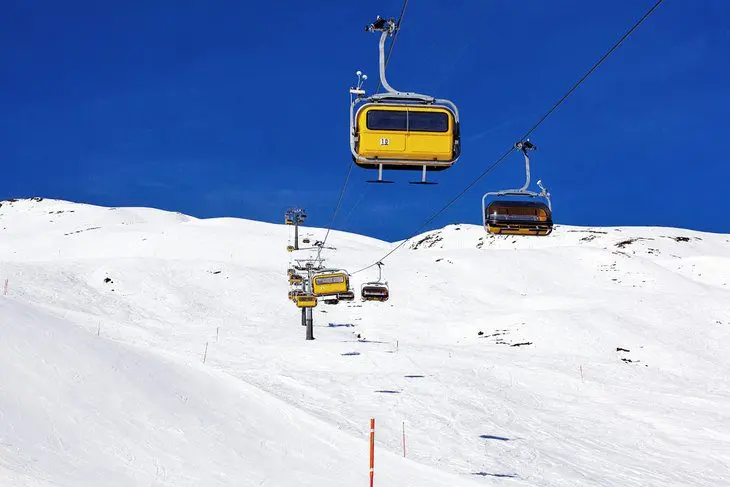
St. Moritz has been the darling of European skiing for a very long time.
It’s a cosmopolitan, glamorous place to visit; the host of past Winter Olympics; and one of the ultimate Swiss winter resort destinations.
Located 1,800 meters above sea level, this beautiful Alpine resort offers great cuisine and is home to the world-famous 1.2-kilometer ice toboggan track known as Cresta Run.
But skiing is one of the most popular things to do in St. Moritz. With 87 pistes and a network of 155 kilometers of slopes, skiers and snowboarders of all levels will find themselves at home here. The ski season lasts from early December to early April, with plenty of sunshine and guaranteed snow due to the altitude and excellent snowmaking.
Accommodation: Where to Stay in St. Moritz
7. Catch the Cable Car to the Top of Mount Titlis
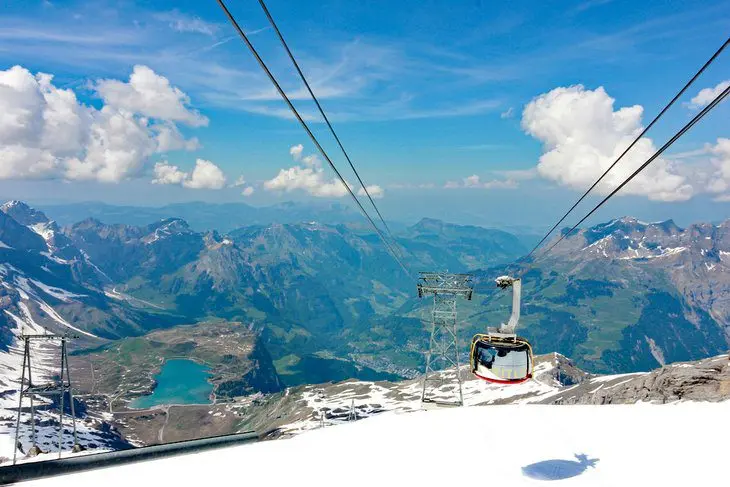
At 3,238 meters tall, Mount Titlis is one of the highest mountains in the Swiss Alps. It’s also home to the world’s only rotating cable car.
The five-minute ride up the snow-covered mountain in the TITLIS Xpress cable car includes a complete 360-degree rotation for breathtaking panoramic views over the Engelberg Valley.
Once at the top of the mountain, more panoramic views await from Europe’s highest-elevation suspension bridge, the Titlis Cliff Walk. One kilometer long and just one meter wide (and subjected to strong winds and lots of snow), the pedestrian bridge has been called one of the world’s scariest bridges.
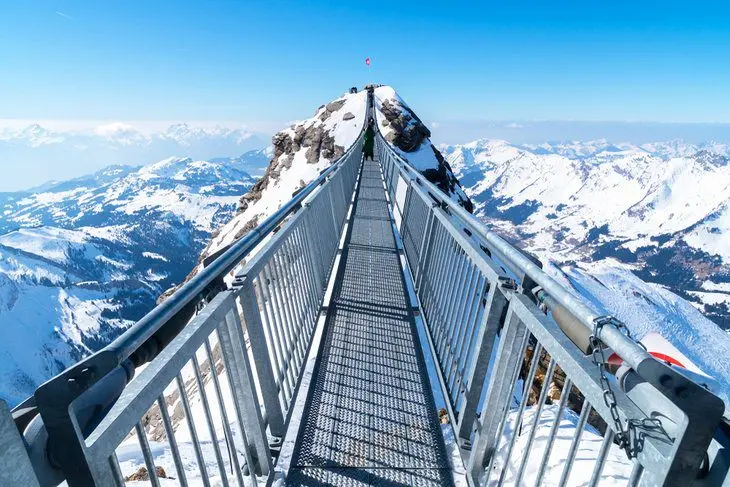
Head back down to discover the over 80 kilometers of skiing pistes that are spread around the bottom of Mount Titlis, where the ski season lasts until May. While it’s always winter, with permanent snow cover at the summit of Mount Titlis, summers are mild and beautiful at the bottom, perfect for hiking.
Read More: From Zurich to Mount Titlis: Best Ways to Get There
8. Take a Boat Tour of the Rhine Falls

Europe’s most powerful waterfall is 23 meters tall and over 14,000 years old, located in northern Switzerland. It was once used to power a millsite, but today is “just” a major tourist attraction.
The best way to experience the falls is to hear them roaring and thundering from as close as possible. For that, you can catch a a boat ride to the heart of the falls, where you’ll have a chance to climb the Middle Rock for amazing 360-degree views of the Rhine Falls.
There are castles on both sides of the falls, and while the Worth Castle is more interesting to tour, Laufen Castle (which dates back to the year 858) across the water has better viewing platforms with a circular walkway.
Read More: From Zurich to Rhine Falls: Best Ways to Get There
9. Ride the Glacier Express
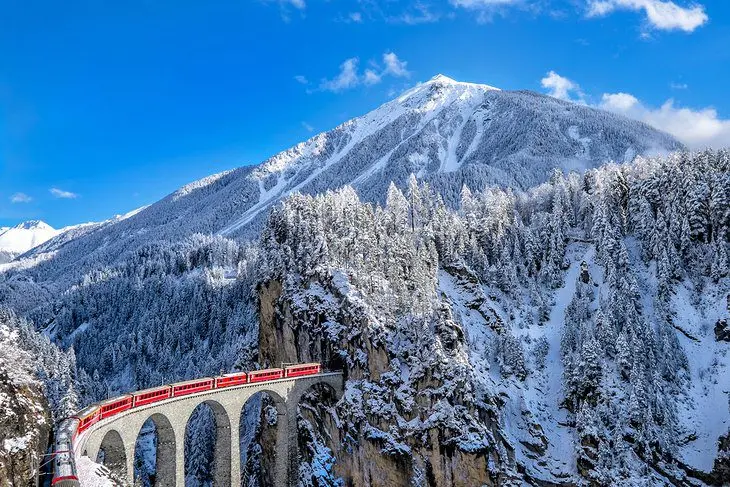
Affectionately known as the world’s slowest express train, the Glacier Express is slow on purpose. It comes equipped with huge panoramic carriages, so you can absorb the stunning views as it travels across fairy-tale Alpine villages, snowcapped mountains, and dramatic tunnels and bridges.
If you were to travel the entire route – from Zermatt to Saint Moritz – the journey would take eight hours and cost quite a bit of money. If you can only pick a section to travel on, the trip between Andermatt and Disentis is a perfect choice.
It takes just over an hour on the Glacier Express and crosses over the Oberalp Pass, 2,000 meters above sea level. Although beautiful all year, it’s particularly stunning in winter, when the surrounding mountains are completely covered in powdery-white snow.
10. Hike in Grindelwald
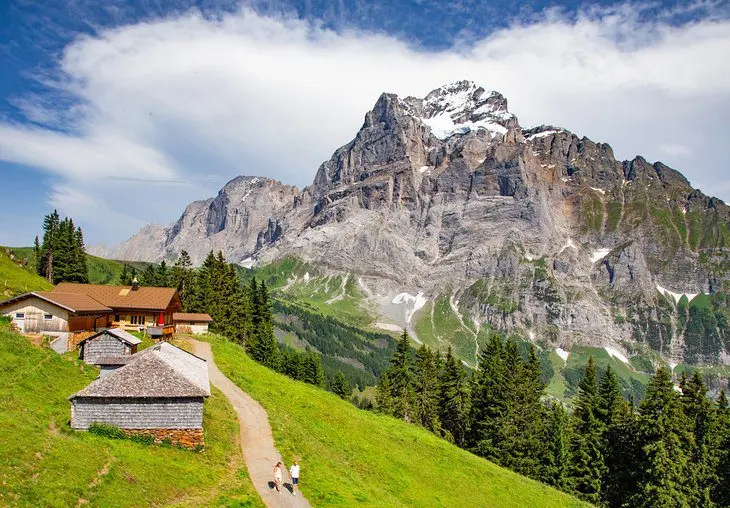
The village of Grindelwald sits in the lush Grindelwald valley, surrounded by stunning 4,000-meter-high peaks, including the Lower Grindelwald Glacier and the popular climbing destination, the Fiescherhorn.
While the village itself has its own charms, it’s best known as the starting point for some of the most beautiful hikes in Switzerland.
A 16-kilometer hike (one way) from First to Schynige Platte should probably be on your must-do list, as it starts with a gondola ride up the mountain. Spend a few minutes at the top taking in the views, then start walking up. You won’t get lost if you stay on the trail, and will be rewarded with views of the snow-covered Bernese Alps, the Jungfrau, and a number of deep blue lakes.
Hiking to the Bachese lake is also very popular, as it packs breathtaking views in a relatively easy hike that’s just six kilometers round trip.
Or you can brave the strenuous 5.6-kilometer-long Grosse Scheidegg to Bussalp hike, which has significant elevation and beautiful views over the Grindelwald Glacier.
11. Climb to the Top of the Grossmünster for Amazing Views Over Zurich
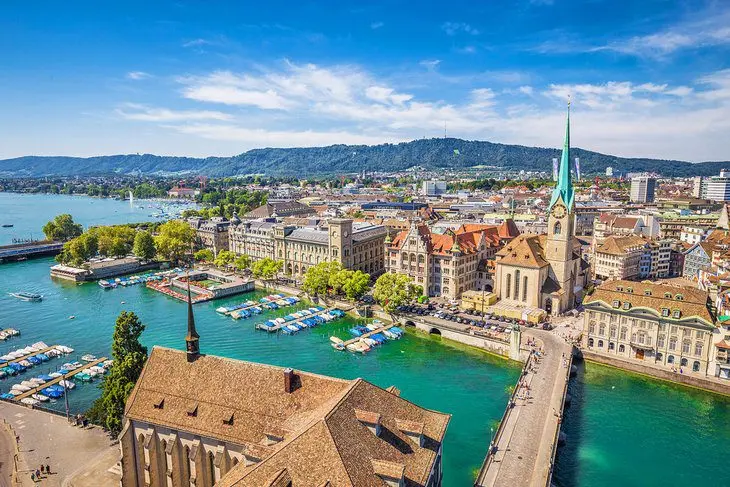
The Romanesque-style Grossmünster church was built in the 1100s, and its twin towers, with its medieval columns and neo-Gothic tops, are the most iconic structure in Zürich.
Step inside for the beautiful stained-glass windows and a cloister museum dedicated to the Reformation, a 16th-century religious reform movement.
Most people coming to the church are there for the views, though. Climb the 187 stone and wood steps to the top of the towers, and you’ll find four outside viewing platforms. From here, you’ll have the best open views over some of Zurich’s top sights, including Zurich’s Old Town, the nearby Fraumünster church, and the river Limmat.
12. Explore Lake Lucerne’s Chapel Bridge
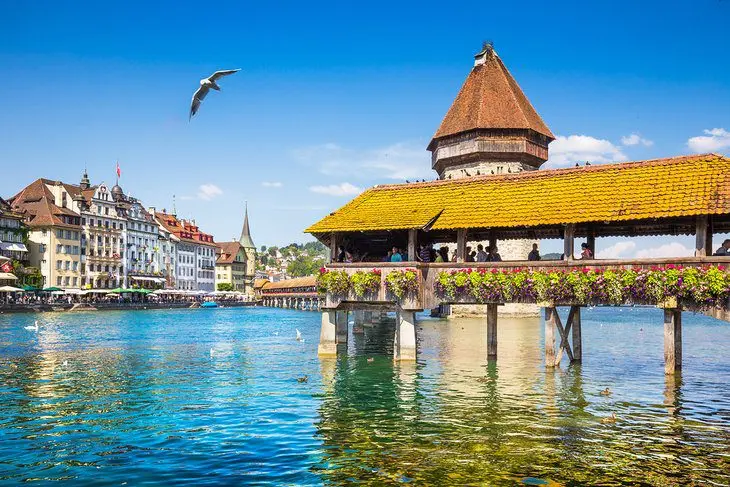
Lake Lucerne is hard to describe in just a few words. Surrounded by breathtaking blueish mountains that give it a fjord-like appearance, and home to historic paddle wheel steamer boats, it feels like a lake out of a fairy tale.
A boat trip is a great way to discover Lake Lucerne, but the heart of the lake is at Lucerne town and the Kapellbrücke (Chapel Bridge). Built in the 1300s, the 205-meter-long covered wooden bridge features 17th-century paintings adorning the ceiling.
Of the original 147 paintings, 100 were destroyed when a fire ravaged the bridge in 1993 – though these have been replaced by 19th-century paintings taken from museum storage.
The 43-meter-tall tower at the end of the bridge was originally built for water storage, but through the centuries served as a prison and archive, and today houses a souvenir shop.
The bridge is one of Lucerne’s most photographed tourist attractions but also a great place to catch the views over town and the blue mountains in the distance.
13. Visit Gruyères, the Cheese Capital of the World
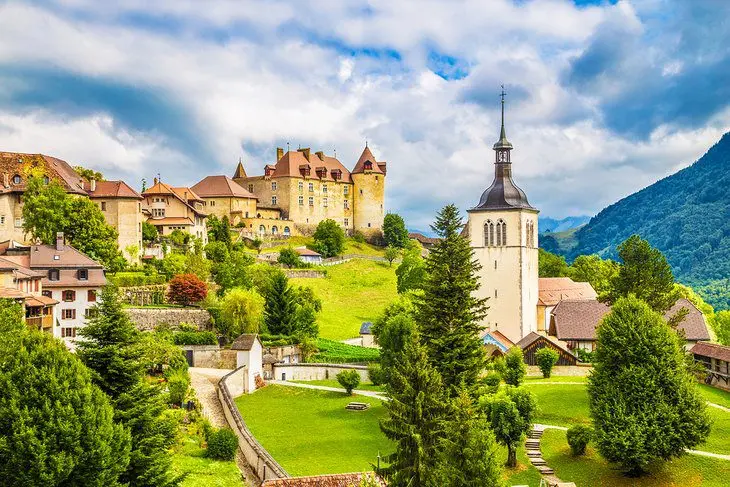
You might naturally associate Switzerland with chocolate, but the famous Gruyère Swiss cheese was also born here. The town of Gruyères is a medieval, picturesque destination sitting on top of a forested hill overlooking a beautiful lake.
It has its own medieval castle and its own trackless train – and a population of just over 2,000 residents.
While it remains mostly rural, Gruyères does attract plenty of tourists who want a peek at the town where the famous cheese originated, as well as the green pastures all around it.
The neighboring village of Pringy has its own cheese factory, which you can tour before ordering some cheese fondue.
Accommodation: Where to Stay in Gruyères
14. Step Back in Time at the Château Chillon
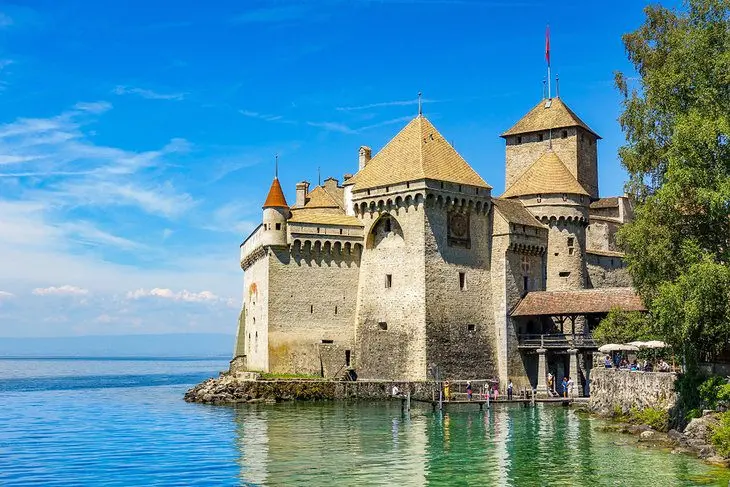
Lake Geneva’s island castle was a Roman outpost before it was expanded and reconstructed in the 13th century. It was used as a prison in the 16th century and then an ammunition depot, before being basically abandoned until the 1800s.
The Chillon castle you see today is the result of heavy reconstruction done in the late 19th century, but famous names were already visiting long before that was completed. From Alexandre Dumas to Mary Shelley, writers and poets came here in search of inspiration and solitude.
Visitors today have a chance to see the chateaux from the water when they take a lake cruise. Or they can just walk through the medieval gates and tour the structure on their own. Remnants of the prison can still be seen in the lower levels, while the rest of the castle features art exhibits, antique collections, and a number of original features.










